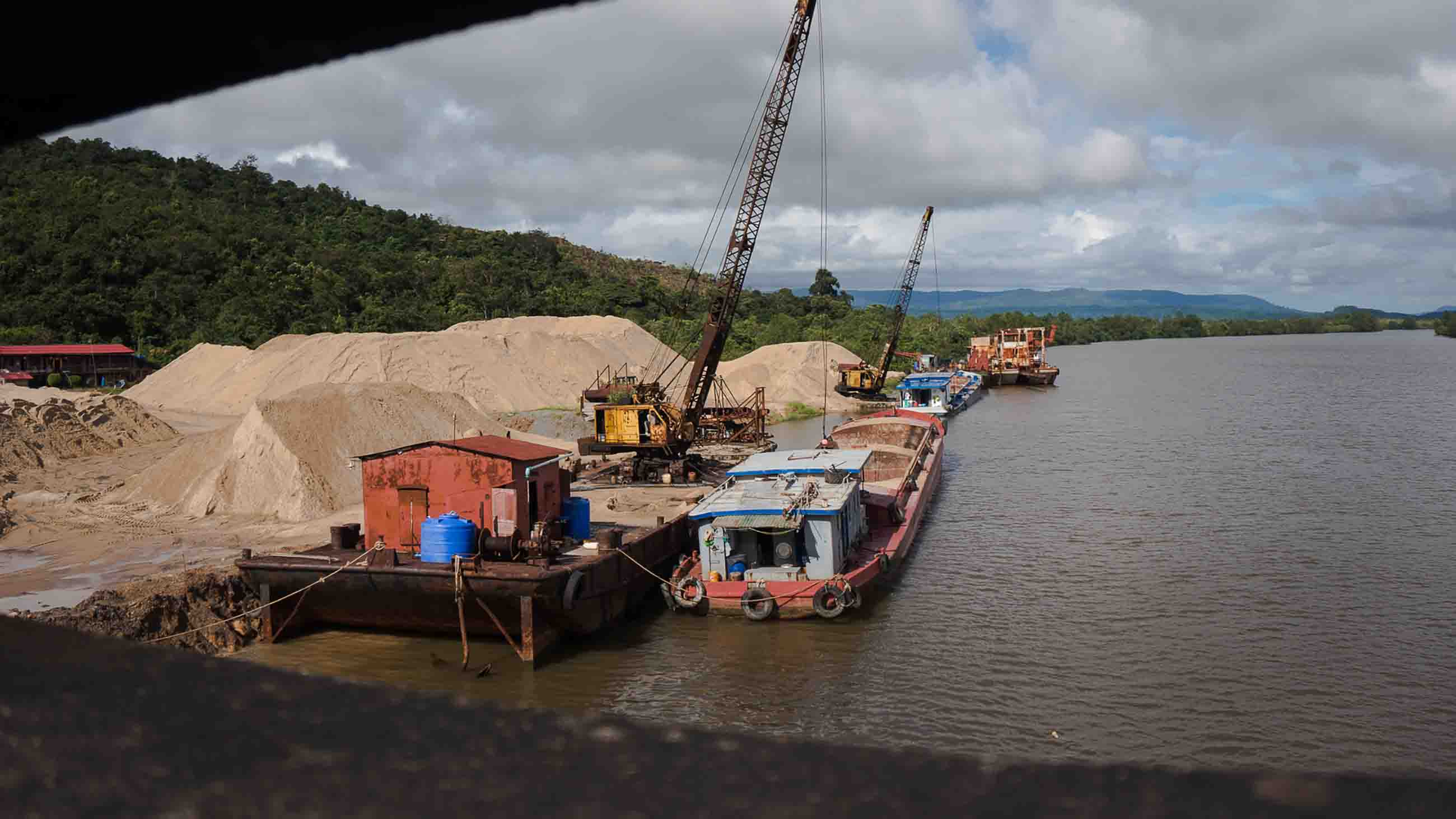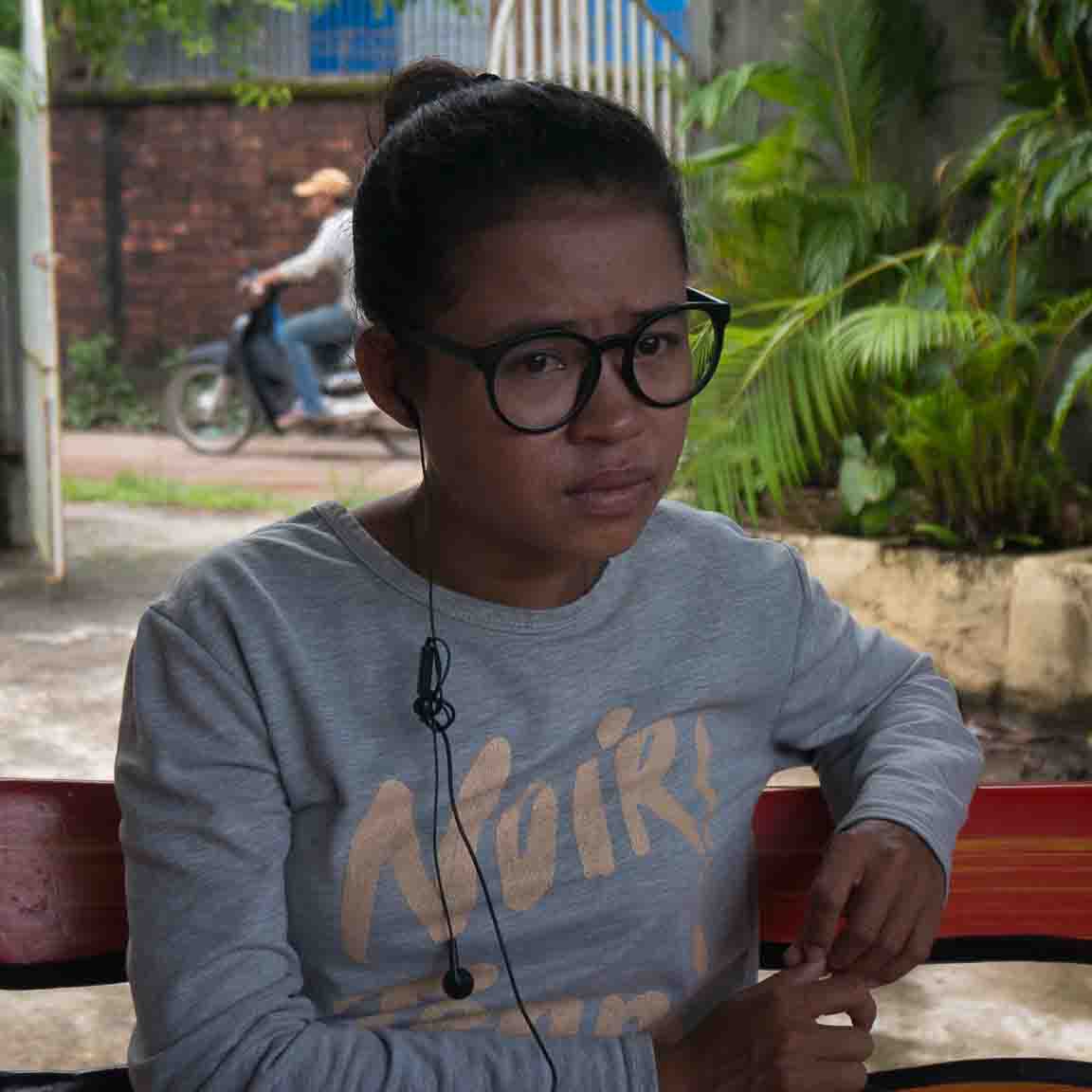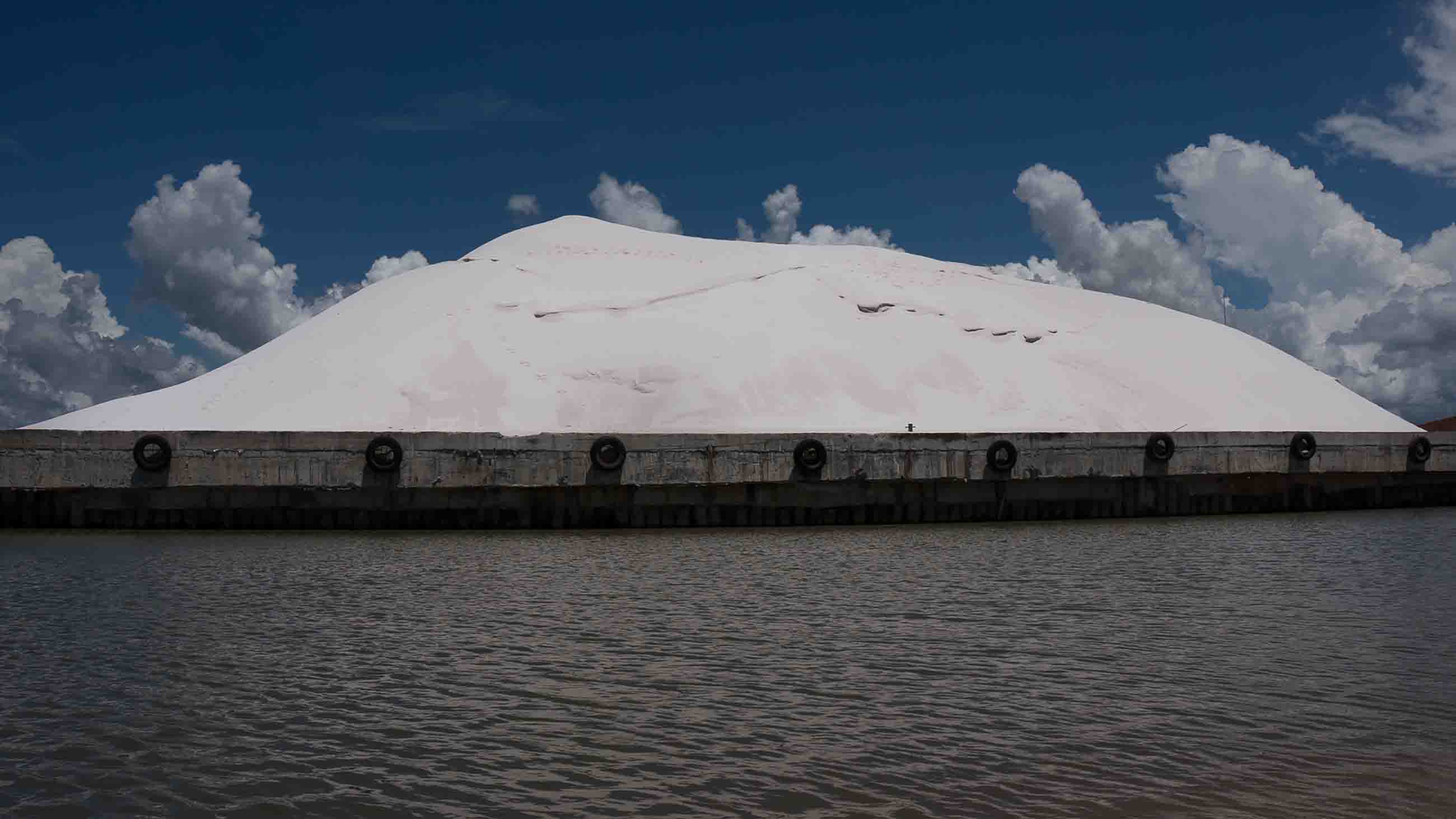In Cambodia, Activists Risk Prison to Expose Ecological Scars of Sand Mining
Dem Kundy and Hun Vannak are in prison. The environmental activists were charged with invasion of privacy and incitement to commit a crime after they were apprehended last month taking photos and filming barges delivering, their colleagues say, piles of sand — as large as whale carcasses — to an international trawler.
The pair have not yet been tried, but they face up to three years in prison if ultimately convicted, and their plight — which family, friends, and fellow activists are working to remedy — underscores a blunt reality in Cambodia, and the world over: Sand is serious business.
Pound for pound, sand and gravel are the most extracted materials on the planet — comprising as much as 85 percent of all mined material in any given year, according to a 2014 report by the United Nations Environment Program. Some 44 billion tons are extracted from quarries, scraped from river and sea beds, or sucked up with massive pumps, after which the material is used to make concrete to help build burgeoning cities, or to advance usable acreage into the sea. Lesser amounts go to making glass or other industrial uses.
Open-pit mining operations leave open wounds on the landscape, easily seen via satellite images, leading to soil erosion and other problems. Increasingly, however, sand extraction has moved underwater to bays and riverbeds, where the impacts of dredging and piping — which can range from habitat destruction for key aquatic species, to compromised storm protection systems, failing shoreline infrastructure, and other issues — remain poorly regulated. “A lack of proper scientific methodology for river sand mining has led to indiscriminate sand mining, while weak governance and corruption have led to widespread illegal mining,” the U.N. report noted.
That assertion would resonate among the activists in Cambodia, which despite its modest size had recently become one of the world’s top 10 sand exporters, with much of its product going to land-expansion projects in Singapore, the world’s largest importer. With its shorelines, interior rivers, and estuaries increasingly ravaged by the industry, Cambodia banned sand exports once and for all in July. The material is still used in domestic construction, but more often it had been going to the highest foreign bidders — typically for cement production or land reclamation. Along the way, environmental groups say, the industry has ruined river shrimp and crab stocks, harmed local ecosystems, and caused protective sand banks to shift and collapse.
The arrested activists and their supporters have argued that the company operating the barges, Ly Yong Phat Group (LYPG), does not have a license to mine sand, and that delivering it to ocean-bound ships implies they are flouting the export ban. “LYPG has been collecting sand near my village,” said Preab Ratha, a community leader from a village near LYPG’s mine in Koh Kong province. She said she regularly takes a boat from her village along the coast to buy supplies from Koh Kong’s provincial capital, often seeing sand being loaded onto international trawlers. “It’s illegal because they don’t have a license,” she said.
Whether or not that’s true is difficult to say. The company itself did not respond to repeated calls for an interview. Sieh Ra, who works for the Ministry of Mines and Energy, confirmed that LYPG has a license to clear forests for rubber plantations, but he would not say if they were also allowed to mine sand. “I’m sure they did the required environmental impact assessments before beginning any projects,” he said.
If true, the assessments have nonetheless not been made public, something Ra admitted was unhelpful. “The assessments should be published so the public can know about the process,” he said, adding that “LYPG has been operating productively in Cambodia for a long time.”
That’s something the activists would likely quibble with. “Vannak and Kundy were arrested because the company was scared they would expose their illegal sand mining,” said Nhiep Sam Oeun, provincial coordinator for Cambodian Human Rights and Development Association. “They pay police to protect their facilities.”
“They don’t have permission to mine sand,” he added, “so the local community is angry.”
One of a series of videos produced by the activist group Mother Nature, to which both Kundy and Vannak belong. The group says this is clear evidence of illegal sand mining.
Both Vannak and Kundy are members of a now-de-registered and, some critics would argue, persecuted environmental activist network in Cambodia called Mother Nature. The group was dissolved last month at the request of its co-founder, a monk named Venerable Thomacheat. “He was sick of being harassed by corrupt cops and officials so he closed it,” said Gigi Nuary, part of the network and Vannak’s girlfriend. Venerable Thomacheat is currently keeping a low profile and not speaking to the press. But Nuary is working with attorneys to help free the two activists while they await their trial behind bars. “The other prisoners know we are activists and always welcome us when we go to prison,” she said. “Our activists tell them about their rights so we are like the teachers of the prison.”
Mother Nature caught the ire of the government throughout its brief existence (it was founded in 2012), chiefly by working to protect Koh Kong’s mangroves and elephant-roamed forests. The organization’s first campaign, its website says, “was aimed at mobilizing local fishing communities, whose livelihoods had been ravaged by the sand mining, and peacefully demanding an end to the massive sand extraction operation.”
In 2016, the group released Facebook videos in the local Khmer language detailing how, out of $752 million worth of sand exported to Singapore for land reclamation projects, the Cambodian government had logged a mere $5 million. It was a key moment in galvanizing support for the July export ban.
Then in September, Mother Nature released documents taken from the import/export logs of Cambodia and Taiwan showing that Taiwan had imported 31,800 tons of sand between 2010 and 2016 — enough to build just over half a mile of highway road — but Taiwanese records show they received 1.9 million tons in the same period — a $36 million discrepancy. The group made another Facebook video, but this time they met with a hostile response.

“This NGO caused all kinds of trouble,” Prime Minister Hun Sen, who has been in power for over 30 years, was quoted as saying in The Khmer Times — an English language daily. He said Mother Nature had long undermined his plans to improve electricity supplies in Cambodia, where daily blackouts are common, via hydroelectric and nuclear power projects.
Undeterred, Mother Nature co-founder Alejandro Gonzalez-Davidson, a Spanish national deported from Cambodia on Hun Sen’s orders in 2015, continued to apply pressure on the sand mining issue by giving press interviews from his current base in Barcelona. “Most imports and exports [in Cambodia] are subject to fraud, falsification of documents and tax evasion,” he said. “I knew we couldn’t stop sand dredging by highlighting the impact against fishing communities … so we have focused on economic crimes.”
Mother Nature was dissolved at the same time the Cambodian government was quashing dissent in a frenzy of closures and arrests leading critics to claim they were destroying opposition ahead of the 2018 general election. In recent months, the leader of the opposition, Kem Sokha, has been imprisoned, deputy opposition leader Mu Sochua has fled the country, and The Cambodia Daily, an English-language newspaper often critical of the government, was closed over an unpaid tax bill.

Gigi Nuary is carrying on the campaign against sand dredging in Cambodia while her colleague and boyfriend, Hun Vannak, is in prison.
Visual: Nathan A. Thompson for Undark
Some people have suggested that Mother Nature’s demise was a part of this anti-democratic chill, but Nuary said it didn’t matter. “It makes no difference to us,” she said. “We are an activist network of volunteers; Mother Nature was just a name.”
So far there has been no official investigation into the activists’ allegations, and the charges against them are pending. Repeated queries to LYPG were ignored, but Som Khet Vean, deputy Koh Kong police chief, confirmed that his officers had arrested two people. “They were detained by security guards working for the [LYPG] company who made the complaint and asked for their arrest, Vean said, adding that was “not his responsibility” to give any more information.
On a recent afternoon, Vannak’s mother and aunt came to meet Nuary at Mother Nature’s former office in Koh Kong town. In Cambodia, prisoners rely on their families to supplement their measly rations, and the pair, wearing traditional patterned head scarves, had brought tins of Khmer sour soup and beef curry. They all sat at a table while monsoon rain assaulted the tin roof and talked about how Nuary had met Vannak while campaigning against a dam project.
Outside, a car crackled down the gravel-muddy road and pulled up to the front of the office. It was Vannak’s lawyer. He stepped out and, clutching an assortment of case notes to his chest, held open the door of his saloon car.
Vannak’s mother and aunt, along with Nuary, piled in, and the group left for the prison.
CORRECTION: An earlier version of this piece described the environmental group Mother Nature as “defunct.” The group was de-registered from the Cambodian government’s list of NGOs, but continues to campaign and operate in the country.
Nathan A. Thompson is the president of the Overseas Press Club of Cambodia, where he has been based since 2013. He has reported for VICE News, The Telegraph, The Guardian, Slate, Salon and The Christian Science Monitor, both in Cambodia and across the region.











Comments are automatically closed one year after article publication. Archived comments are below.
Extraction of sand along the Mekong and tributaries to feed Phnom Penh’s voracious construction industry appetite is also a serious cause for concern. Despite numerous official orders to ban the practice, every day you will see from Takhmau sand-barges laden one way, empty the other, plying along the banks of the Tonle Bassac. One day I photographed them over several hours and that evidence on its own allowed a renowned international expert to calculate that the “entire annual bedload of the Mekong is being removed by dredging activity”. At the same time river-banks have collapsed, causing deaths and destruction of houses. All of this unchecked exploitation of natural resources is of course an exact copy of the logging of forests and blatant expropriation of land, most obvious in the damage it has done to indigenous ethnic minority communities. So far it has proceeded with complete impunity and without a care for sustainability.